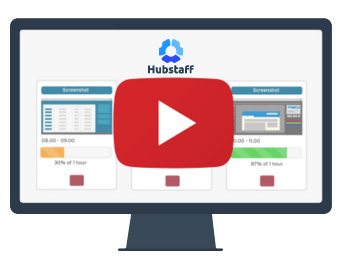Developer Interview Questions & Preparation

Hiring freelance developers is about finding the right mix of hard and soft skills. You want someone who can dive right into projects and who can work well with other members of your team, whether in-person or remotely.
There are several ways to test these skills throughout the interview process. Putting in the effort up front will pay off in the long run when you hire the best person you can for your organization.
When the initial pool of applicants comes in, carefully review each resume to look for specifics about projects they've completed. As with any field, be wary of resumes that are filled with fluffy, non-specific language. For example, if you are hiring a JavaScript developer, then you should expect to see at least a few JavaScript-specific projects listed unless you are filing an entry-level position.
This is one of the most time consuming parts of the interview process, but the time you put in at this stage will pay off down the road when you hire a quality candidate. It's better to weed out unqualified applicants at this stage rather than wasting their time and yours on an interview if they are not technically equipped for your developer position. However, be open and flexible with your job descriptions as a developer with solid practical experience may be a better fit than someone with a computer science degree but no coding experience.
If you are working with a hiring committee, you may choose to weed out some of the unqualified resumes on your own, then pass along the rest to the committee for their input before starting job interviews.
Developer Interviews
Once you've made the initial cut, the interview is an opportunity to drill down further and begin assessing a candidate's personality and fit for your team. Ask candidates about their past projects and have them describe their work on those projects, including their successes and failures.
Although a tech interview should include questions about software development, side projects, source control best practices, etc., it is most important to guage the candidate's thought process if you want to find a truly great developer.
The way they respond will tell you a lot about whether they were passionate and engaged with their previous positions, and will help you to understand whether they will be able to get passionate about your business. You should see some parallels between what someone talks about in an interview and what appeared on the resume and cover letter.
How to Run a Developer Interview
The interview is a great time to ask about their preferences for working style and team communication to determine whether they are a match for how your team operates. Even if your developer will never meet the rest of the team in person, it's important that he or she work well with everyone and contribute to a collegial environment.

Ask about specific project and time management tools that your candidate uses to track work and meet deadlines, and about how they prefer to communicate with team members. You might even pick up a tip about a new tool or system your are not currently using.
The interview should also include a technical evaluation. The most common way to do this is to have a candidate complete a small project within a given timeframe and send the results to your company's technical team for review. The assignment should be in line with something the candidates would actually do for your company in order to truly gauge whether their skills are up to par. Make sure to set a specific deadline and be clear about when the candidate will receive the results back.
Additional Interview Tips
If possible, include more than one person from your team in the interview so you can gain multiple perspectives on the candidate and determine whether he or she will be a good fit for the position.
For an on-site developer position you may choose to meet with the candidate in a more informal setting to get a better sense of their personality. Interviews are very formal by nature and even the most seasoned candidates will be a little stiff and hesitant to let their true personalities show through.
Taking someone to lunch or happy hour is a good way to observe how they interact with your team in a less formal setting and learn more about them as a person beyond what appears on a resume. Unfortunately, this does not really work for a remote position, but you could learn more about the candidate by asking about what he or she does outside of work during the interview.
How should a non-technical hiring manager interview a developer?
There's no rulebook for interviews that says the person conducting the interview has to have the same skill set as the person on the other end of the table.
With that in mind, the best way to approach hiring technical positions like developers is to be confident in your abilities as a non-technical manager and honest about your role and your skillset and enlist help wherever possible.
While you might not be able to assess a candidate's technical skills, you can determine whether their personality and work experience are a good match for your organization. That will go a long way toward making the right hiring choice. You can teach someone a technical skill, but you can't teach things like organization and project management quite as easily.

What are some Non-technical Developer Interview Questions?
- What project from your career are you most proud of and why?
- Describe a project you completed that involved a complex process or processes. What did you do to stay on track and ensure that you were following the process?
- Please provide an example of a time when you came up with a way to change an existing process or function. How did you convince others that it was the right thing to do?
- What do you do when faced with a new task that you have not done before?
- Tell me about a time when you missed a deadline or were not able to deliver a project on time. How did you handle this situation and what did you do to prevent it from happening again?
- Describe a time when a project your were working on changed midway through. How did you deal with this change?
Be open with the candidate about the fact that you are in a non-technical role and do not be afraid to ask for additional detail if needed. Strong candidates should be able to explain their work to you in non-technical terms and provide references that may be more familiar to you.
These explanations are a good indicator of how a developer will interact with non-technical members of your team. If you can follow along as a non-technical hiring manager, that bodes well for any other non-technical staff the hire will work with on the team.
Whether it's requirements gathering or user testing, nearly every technical position will have some level of interaction with non-technical staff. This aspect can easily be overlooked when the hiring committee is only made up of technical people.
Candidates should also be able to answer difficult technical questions comfortably and have a variety of projects to draw from when providing examples. The projects cited should be in line with those that appear on the resume and cover letter.Get Technical Interview Help
If you have the opportunity to add others to the interviewing committee, consider bringing in a representative or two from your technical team. They can ask candidates about technical details from their resumes and report back to you on how well the candidates answered the questions. Ideally, this would be someone in a similar role to the position you are trying to fill.

If this is not possible, ask them for interview question recommendations and insight into how you should approach the interview process. A developer will know what questions to ask and how a candidate should respond to them. They may even be able to provide you with a list of keywords to listen for during the interview.
Interview questions should be specific and ask for examples from their previous positions. From a non-technical perspective, you are trying to determine how they prefer to work, how they interact with supervisors, and how well they understand what your organization does.
You should be able to tell pretty quickly whether or not they've done their homework about who you are and what you do, and whether they see themselves fitting into your company's culture.
There's a lot of demand for developers in the marketplace; if a candidate is not excited about your organization and the work it does, he or she might be looking for another job before you know it.
How to Decide Which Freelance Developer to Hire?
At the end of the day, you are looking to ascertain how well your candidates completed a project or projects, not necessarily the technical details of how they did it. Keep this distinction in mind throughout the interview, especially if it becomes bogged down in technical details.
Regardless of what the project was, the candidate should be able to reflect on what their role was, how they performed their assigned tasks, how everything turned out, and what lessons they learned from the experience.

Conclude the interview by asking the candidate to provide references from previous clients or employers. This will allow you to check some of the skills mentioned during the interview, and gain an additional perspective on what that person is like to work with.
You should be looking for an evaluation of the candidate's technical and non-technical skills. Again, mention to the references that you are a non-technical hiring manager to set the appropriate tone for the conversation.
Keep in mind that non-technical people hire technical positions all the time, and this might not even be a candidate's first experience with a non-technical hiring manager. If you do not make a big deal about being non-technical, neither will the candidate.
Much like any other part of the workplace, clear communication and expectation setting are the keys to success. Keep these ideas in mind and you'll lead a successful search that will hopefully land you a rockstar candidate for your team.
Over 8,000 remote teams trust Hubstaff
Do you have a remote-based business? If so, you understand the challenges that come with tracking billable hours, understanding what your team is working on, timezone challenges, and setting priorities in a remote environment. Hubstaff can help.
Hubstaff makes managing teams easy
Hubstaff offers time tracking with screenshots, activity levels, automatic payroll, 30+ integrations, team analytics, and more.
14 Day free trial
All features included
Try Hubstaff
